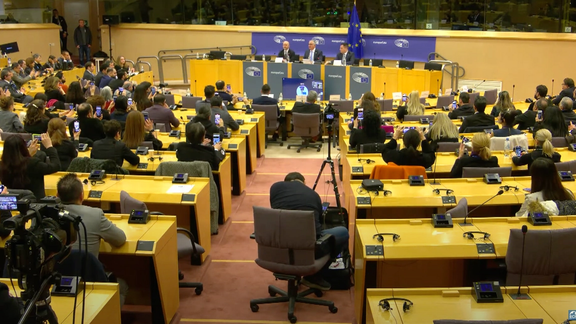Exiled Prince Tells European Parliament About Future Of Iran

Exiled Prince Reza Pahlavi delivered a speech Wednesday and answered questions about post-Islamic Republic Iran at the European Parliament in Belgium.

Exiled Prince Reza Pahlavi delivered a speech Wednesday and answered questions about post-Islamic Republic Iran at the European Parliament in Belgium.
Pahlavi, who has been very active in recent weeks advocating the “revolution in Iran,” was hosted by the Swedish Member of the European Parliament Charlie Weimers and Czech MEP Tomáš Zdechovský. His visit to Belgium is the latest leg of his European tour packed with meetings aimed at garnering support for the newly formed Iranian democratic opposition and pushing for sanctions against the Revolutionary Guards – the IRGC.
His speech was focused on how European countries will benefit from a regime change in Iran along with the Iranian people themselves. He elaborated on the economic benefits that a democratic Iran would herald for Europe in addition to security issues. Mentioning some terrorist activities in Europe by the Iranian regime he called on the MEPs to help further isolate “the regime that occupies” Iran, and expand their support for the Iranian people.
The United States and European countries have sharply criticized the Islamic Republic for its deadly crackdown on protests, but only the US has sanctioned the IRGC, while Europe still hesitates.
He highlighted that the Islamic Revolution of 1978 was never meant to be confined to Iran’s borders by its authors, adding that many leaders of the Islamic Republic, especially its founder Rouhollah Khomeini, do not see Iran as a nation but a vessel to export the Islamic Revolution.
He said now that different opposition voices have united in an unprecedented fashion to oust the regime, it is time for Western democracies to engage with and support the Iranian people.
Pahlavi said that support from European countries also benefits Europe and the wider Western world “because the movement for freedom and democracy in Iran carries the promise of a brighter, safer and more prosperous future for all democratic nations.”
Pahlavi went on to enumerate the threats posed against European countries by the Islamic Republic, describing its military support for the Russian invasion of Ukraine as the latest example. “The Islamic Republic is the only government outside Europe to be actively aiding and abetting Russia’s invasion through provision of military equipment,” he reminded the parliamentarians.
Emphasizing that he would never support a foreign war against Iran, Pahlavi said that “this regime is waging war against Europe, against its land, people and culture, just as it has waged war against my country since its inception. That is why it is of utmost importance that the European Union confronts this regime and holds it accountable for its criminal behavior.”
He said designating the IRGC as a terrorist organization by the European Union is the first step that “would limit meaningfully the regime’s ability to oppress Iranian people and terrorize yours.”
He said that Iran will become an ally of Europe and the Western world after the Islamic Republic, and assured Europe that a vacuum of power would not happen after the fall of the regime. “Iranian people have the talent and the will, the technical experts, the political forces and the national unity to manage a transition from this regime to a secular democracy,” he boasted.
He continued that the path towards establishing a secular democracy in Iran begins with acknowledging “two fundamental truths: that the Islamic Republic poses an existential threat to Iran and its people and that the Islamic Republic cannot be reformed.”
Stressing the necessity of overthrowing the regime in the shortest possible time, he underlined that Europe's support for the protesters in Iran “can significantly reduce the time and the cost of their brave struggle.” The people are the true sovereigns of Iran, not the Islamic Republic, he said, asking the European countries to recognize their struggle. “May light triumph over darkness,” he concluded and received a standing ovation from the MEPs.

He also answered several questions by the representatives, some with Iranian heritage, about the future of Iran. “How could you possibly get an answer to a problem by talking to the people who are part of the problem?” he quipped in response to a question about the hesitation by those who opt to appease the regime in fear of the consequences.
Answering a question about the nuclear deal and the future of nuclear weapons, he pointed out that the problem is not the gun but the finger on the trigger. He said it is the nature of this regime that cannot be trusted regardless of what document they sign. He emphasized that decision about the country’s nuclear program would be taken by the future government of Iran.
In a historic joint event in Washington on February 10, eight prominent opposition figures held a forum, signaling the emergence of a leadership council in the diaspora to campaign for international support in favor of Iran’s protest movement. They also called for support from democratic countries to change the regime in Iran and establish democracy.
Earlier in the month, more than 20,000 Iranians held a protest rally outside the European Council in the Belgian capital, to call on the European Union countries to designate the IRGC as a terrorist organization. Thousands of Iranians from all over Europe held a massive rally in Strasbourg in January to pressure the European countries to list the IRGC.